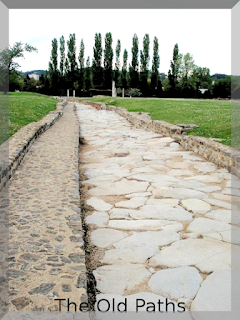http://www.oldpaths.com/Archive/Davison/Roy/Allen/1940/tattoos.html
Does tattooing desecrate the body?
“How sad when people desecrate their beautiful God-given
bodies with tattoos.”
One brother objected when I made the above statement
because people he loves have tattoos. I also love people with
tattoos, which is why their tattoos make me sad.
First, although I will explain why a Christian should not
get a tattoo, I wish to emphasize that there are fine, dedicated
Christians who have tattoos as indelible marks of their former
life. A tattoo is a permanent mutilation of the body. Thus, as
one new Christian said, “When I was baptized my sins were
washed away, but my tattoos are still there.” Another Christian
comforted him, “Don’t worry! They will be gone in the
resurrection!” Christians with indecent tattoos hide them from
view if possible, of course.
Israel was told, “You shall not make any cuttings in your
flesh for the dead, nor tattoo any marks on you: I am the
LORD” (Leviticus 18:28).
What does this mean and does it apply to a Christian?
Christians serve God under the New Covenant, not under the
law of Moses. Thus, as a law, this does not apply to a Christian.
“Whatever things were written before were written for our
learning” (Romans 15:4), however, thus we must still ask if
there are truths we can learn from this passage. And, are there
teachings in the New Covenant that indirectly condemn getting
a tattoo?
Some claim that Leviticus 18:28 relates only to idol
worship and does not apply to tattoos in general. The verse
itself, however, does not limit the condemnation to idol
worship.
“In Leviticus 19:28 we find two prohibitions of an
unnatural disfigurement of the body: ‘Ye shall not make any
cutting in your flesh for the dead, nor print any marks upon
you.’ The latter (Hebrew: qa aqa, incision) refers to tattooing,
and has no reference to idolatrous usages, but was intended to
inculcate upon the Israelites a proper reverence for God’s
creation” (Merrill F. Unger, Unger’s Bible Dictionary, 1974 ed.,
p. 696).
“While ‘cuttings in the flesh’ have reference here to
mourning customs [for the dead], the tattooing does not
appear to pertain to such practice” (Wycliffe Bible Encyclopedia,
1975 ed., p. 1664).
Thus, from this passage we learn that God does not want
us to mutilate our bodies.
The respect that we are to have for our bodies as
Christians is raised to a higher level in the New Testament. “Or
do you not know that your body is the temple of the Holy Spirit
who is in you, whom you have from God, and you are not your
own?” (1 Corinthians 6:19). The body of a Christian belongs to
God! “I beseech you therefore, brethren, by the mercies of
God, that you present your bodies a living sacrifice, holy,
acceptable to God, which is your reasonable service” (Romans
12:1).
The body of a Christian is holy and ought not to be mutilated or subjected to needless harm.
Tattoos mutilate the body and make it vulnerable to infection.
Each puncture of a tattoo needle involves a risk of acquiring
blood-borne diseases.
Our skin provides protection against disease. A tattoo gun
can puncture the skin up to 3000 times a minute. Each hole is
about one millimeter deep and breaches the skin’s protective
layer. A tattoo consists of thousands of puncture wounds into
which insoluble ink has been injected.
“Tattooing poses health risks because the process exposes
blood and body fluids. Because of this, a person who gets
tattooed risks getting a disease or infection that is carried
through blood. These blood-borne diseases include hepatitis B
and C, tetanus, and HIV” (Bonnie B. Graves, Tattooing and
body piercing, p. 40).
In 1991 Dr. Paul Fisher noticed among his patients an
abnormally high amount of hepatitis C, a serious viral liver
infection. By surveying 600 patients, he and Dr. Robert Haley
discovered that the disease was being contracted through
tattooing.
A Christian’s body belongs to God and ought not to be
desecrated and subjected to needless risks by tattooing. Forgiveness is
of course available to Christians who repent, but the mark will remain.
Roy Davison
The Scripture quotations in this article are from The New King James Version. ©1979, 1980, 1982, Thomas Nelson Inc., Publishers.
Published in The Old Paths Archive
(http://www.oldpaths.com)

No comments:
Post a Comment